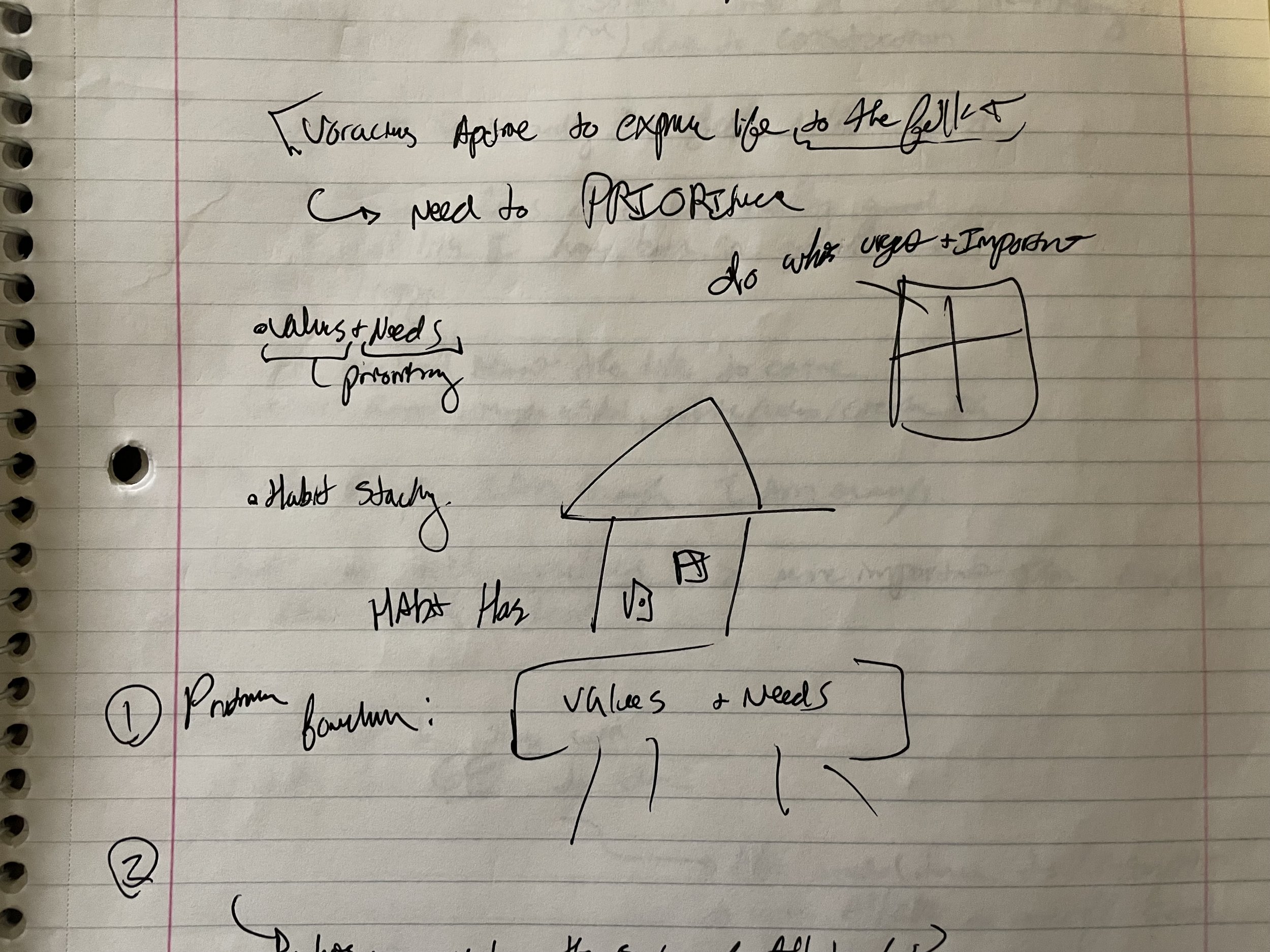The Habit House: The Foundation
Welcome to a unique series of posts where I will explain certain mental models and frameworks through visualizations of a “Habit House.”
Here is a poor visual model that I came up with during one of my therapy/coaching sessions:
Here is a slightly better model:
(I will try to add more overly-alliterative descriptions to this model as we go). (Please send me any name suggestions)!
The Habit House must be set upon a formidable foundation. No sand infrastructures being washed away by heavy rains here, please.
What shall be the bedrock of this theoretical framework? Values and Needs.
Values: A guide. Your decision-making compass.
Ex. Values such as Relationships or Time.
These Values precede any action.
Since I value relationships, I try to make a concerted effort to maintain my current relationships and grow new ones. I do this by trying to keep up with friends through regular communication such as text, email, and calls. I also try my best to be 100% present when I am having intentional conversations. (I am better at the latter and working on the former).
Values are what you innately care about. If you have trouble nailing them down, you can also think about what makes you feel dissonance.
For example, I value time. When I show up late to events or meetings, I feel bad about it. When one does not act in accordance with their values, one should feel some sort of cognitive dissonance. (This is a value I recently discovered as true. I am working on aligning my actions and making sure that I am more on time. For me, that means pairing down the things that I do and adding “fudge-time” between events to account for the unaccountable such as travel or events running past schedule.
Needs: I think of needs in a triangle segmented into thirds. Mentally picture the outdated food pyramid…got it? Good.
The base: You’ve got your basic needs such as food, shelter, and water. Easy.
Middle: Think of an optimized base. A step further. This means instead of just “food” you are focused on your nutrition as a whole.
These are your inputs: Proper diet, sleep, exercise, and community.
Top: These are your “in the moment” needs. It is another step further and can be harder to identify.
These happen in the moment. They stem from the phrase, “listening to your body” and can take shape in many forms.
For me, a lot of what I have been working on is with energy management. I have developed a strong tendency to not listen to my body, especially when it comes to work, exercise, and community.
Even when I am low energy, I will still push myself to work on things when I am mentally drained, work out when my body is physically drained, or hang out with friends when I am relationally drained.
NOW! I am not saying to be undisciplined. For me, I just have to be better at not overcommitting to things. The problem that arises is that when you don’t listen to your body, there will be a point where it can’t handle it, overall function/performance drops, and you become sick and burnout.
I am a long subscriber to the Goggins and Jocko mindsets of “staying hard” and “discipline=freedom.” However, there is a more optimal balance, and I believe this can be achieved with proper self-care. (I plan to delve further into this topic, and my experience, in another blog post).
If you try to force yourself into a mold that does not fit your unique self, you will be miserable. Case and point. Prior to even finding a path to push down; or fitting a mold… you must create and hypothesize your mental framework. For example, if you just try to “eat healthy” or “ workout” because that’s what everyone “should do” or because you feel like you “have to” since that’s what your friends are doing… it’s gonna frikin suck, and you probably won’t achieve your desired state.
And it’s not gonna suck because you hate eating your green leafy vegetables or wheezing whilst working out. It’s going to suck because you are trying to build your House of Habits on the sand, rather than something more (metaphysically) concrete. It’s going to suck because you haven’t bought into the WHY behind your action. And eventually, you will burn out.
As Simon Sinek (Start with Why), Krissy Cela, Ali Abdaal, and many others more qualified than I, have said something along the lines of; “aligning your actions behind your “why,” will greatly improve your tenacity.”
If your values and needs are aligned with your action. You will have the mental fortitude to persist through the hard times. To persist past “tired,” “I don’t feel like it,” and frankly, many of the other B.S. excuses our minds froth up.
Your why. Your fictional foundation made of stone, will not be washed away by the allegorical flood.
You will more likely follow through and accomplish what you set out for.
Like many of the things I may write here, it’s easier said than done.
Let me know if this helps, makes sense, or any thoughts below:)

